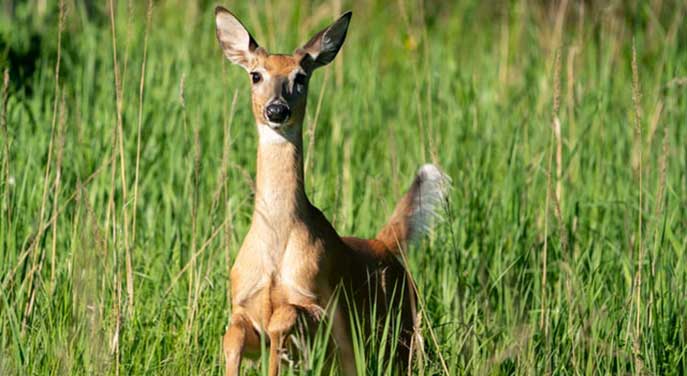A variant of the prion protein may reduce the spread of chronic wasting disease (CWD) among white-tailed deer, according to a new study by University of Alberta scientists.
This variant of the prion protein, called the S96 variant, blocks CWD transmission in the lab – an important discovery in the fight against the highly contagious neurological disease.
“This discovery is important because it suggests that there is at least one genetic variation in the prion protein that would block CWD transmission in white-tailed deer,” said Debbie McKenzie, professor of biological sciences in the Faculty of Science.
“There are currently no methods available, other than removal of deer from the landscape, to stop or slow the spread of CWD. The S96 protein is a potential tool for decreasing the spread of the disease.”
CWD is a neurological disease, similar to Creutzfeldt-Jakob disease, that affects mule deer, white-tailed deer, moose, elk and caribou in North America. CWD causes degeneration of brain tissue and is fatal. It is the only disease of its kind found in wild animal populations.
“This is an exciting finding, providing a biochemical mechanism for what has been suspected from surveys of deer populations: that the prion protein gene variant, the 96 allele, confers a significant level of protection from CWD infection. This will be an important tool to slow or stop the spread of this inevitably fatal brain disease,” said study co-author Judd Aiken, professor in the Faculty of Agricultural, Life & Environmental Sciences.
One potential application of this research is in game farming. Farmers and managers may be able to breed deer with the S96 protein to reduce susceptibility to the most common CWD strains.
Aiken and McKenzie are both members of the U of A’s Centre for Prions and Protein Folding Diseases. Funding for the research was provided by Genome Canada, Genome Alberta and the Alberta Prion Research Institute.
The study, “White-tailed deer S96 prion protein does not support stable in vitro propagation of most common CWD strains,” is published in Scientific Reports.
How to help stem the spread of CWD
U of A biologist Debbie McKenzie has the following advice:
- Wear gloves when field dressing animals. Treat knives and other equipment with 50 per cent bleach to ensure removal of CWD-causing prions.
- Wash off any fecal matter that accumulates on footwear when hiking in CWD-affected areas.
- If hunting in CWD-affected areas, have your deer tested before consuming venison. Though there is no evidence of CWD transmission to humans, test-positive deer should not be consumed.
| By Katie Willis
This article was submitted by the University of Alberta’s Folio online magazine. The University of Alberta is a Troy Media Editorial Content Provider Partner.
© Troy Media
Troy Media is an editorial content provider to media outlets and its own hosted community news outlets across Canada.




